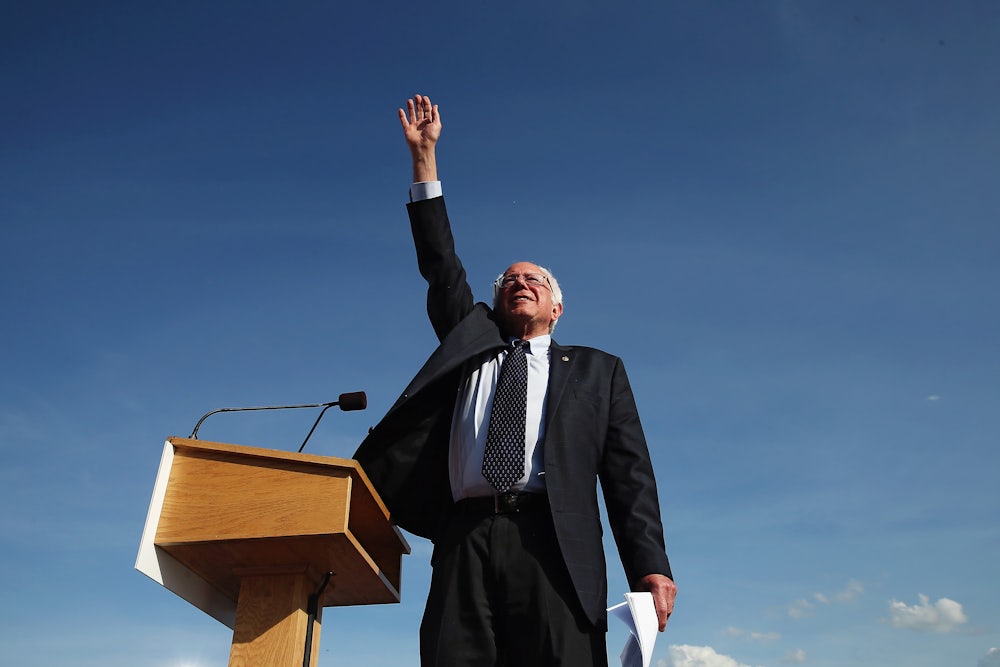The Bernie Sanders campaign has spent much of August squabbling with news outlets. “There seems to be a direct correlation between the media’s coverage of polls and Bernie Sanders’s specific standing in those polls,” Sanders adviser (and 2016 campaign manager) Jeff Weaver told reporters earlier this month. “The better the number is in the poll, the less coverage he’s received, and the worse he does, the more it receives.” The same day, Sanders himself took aim at The Washington Post, suggesting that unflattering coverage he received in the paper was tied to his criticism of Amazon—which, of course, shares an owner with the Post. Even an anodyne softball game between Sanders’s staff and members of the press became a source of (minor) controversy.
Sanders quickly walked back his criticism of the Post. “Do I think Jeff Bezos is on the phone, telling the editor of The Washington Post what to do? Absolutely not. It doesn’t work that way,” Sanders told CNN. “What I think is in the media in general there’s a framework…. For example, I’ve been in politics for a few years. You know what? Not one reporter has ever asked me ‘Bernie, what are you going to do about the grotesque level of income and wealth inequality?’”
Though not perfectly articulated, Sanders had a point. By attrition and consolidation, the media is dominated by a handful of large, corporate institutions—as a result, the priorities of what is and isn’t covered are often skewed.
On Monday, Sanders wrote an op-ed in the Columbia Journalism Review that both expands on that media critique and provides a compelling vision of a better future—for the press and for everyone else. It is, like much of the senator’s best work, an amalgam of concerns: the role of corporations and financial institutions in everyday life, growing income inequality and corporate consolidation, and the state of democracy. The plan is, to a large extent, an antitrust plan disguised as a media policy—though, if enacted, it would do a great deal to reverse the technology- and hedge-fund-induced ravages of the past decade.
The CJR op-ed starts by making the case that journalism must be saved from the corporate media’s love of shallow and self-serving commentary:
Real journalism is different from the gossip, punditry, and clickbait that dominates today’s news. Real journalism, in the words of Joseph Pulitzer, is the painstaking reporting that will “fight for progress and reform, never tolerate injustice or corruption, [and] always fight demagogues.” Pulitzer said that journalism must always “oppose privileged classes and public plunderers, never lack sympathy with the poor, always remain devoted to the public welfare, never be satisfied with merely printing news, always be drastically independent, never be afraid to attack wrong, whether by predatory plutocracy or predatory poverty.”
When we have had real journalism, we have seen crimes like Watergate exposed and confronted, leading to anti-corruption reforms. When we have lacked real journalism, we have seen crimes like mortgage fraud go unnoticed and unpunished, leading to a devastating financial crisis that destroyed millions of Americans’ lives.
Sanders correctly notes that reporting is under assault from a variety of forces, but, most notably, media consolidation, along with Google and Facebook, which have gutted the journalism industry’s economic model.
As president, he would place a moratorium on media mergers—like the one between Gannett and GateHouse, which would likely result in thousands of layoffs. There would be steps taken to reduce the ability for one corporation to control multiple media outlets in the same market (something much more strictly regulated in the era before the Telecommunications Act of 1996), and to limit the number of stations that one corporation can own—something that would put the propagandists at Sinclair Broadcasting in a Sanders administration’s crosshairs. There would also be considerable efforts to increase journalists’ input in their workplaces through stock-ownership plans and stronger unions.
Sanders also fires a shot across the bow of Silicon Valley, writing that he would direct the Federal Trade Commission to “stringently enforce antitrust laws against tech giants like Facebook and Google, to prevent them from using their enormous market power to cannibalize, bilk, and defund news organizations. Their monopoly power has particularly harmed small, independent news outlets that do not have the corporate infrastructure to fight back.”
But this is not just a media plan. It is more accurately an entire domestic agenda in microcosm—a portrait of an approach in which antitrust laws are enforced and workers are empowered. But as a media plan, it’s an effective one. The focus on Trump’s relationship with the media is often a distraction from the large, structural problems facing news organizations. Sanders’s plan puts those structural problems front and center. Journalism has been gutted this century by financial raiders and tech firms; the only way to save journalism is to reduce the influence and power of these outside corporations. Local news may need more than is offered here, though disempowering the hedge funds and conglomerates that have wreaked so much havoc is a good place to start. (If Sanders wants to throw a local outlet a bone in the meantime, he should talk to his local paper.)
Nothing in this plan, of course, would change the stuff that Sanders and his staff have been grumbling about. Politicians will always question their coverage and, while Sanders has more to complain about than most, the op-ed page at The Washington Post isn’t going anywhere. But after weeks of criticism for his comments about the Post, Sanders’s media plan shows that he recognizes the significance of real journalism in a way that few other candidates seem to—and that should count more than a few throwaway lines about Jeff Bezos.
